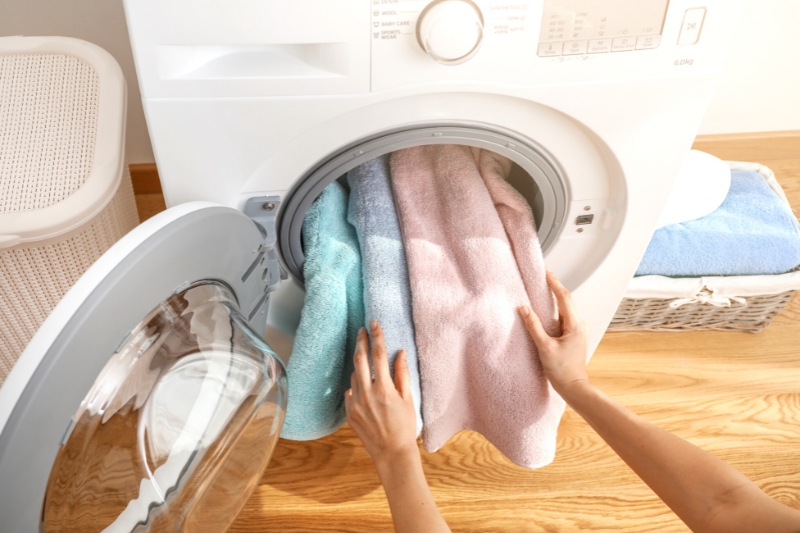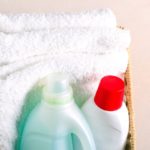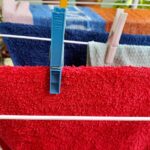Washing towels is a household chore that no one can avoid. But when it comes to loading them into the washing machine, many people wonder how many they can safely put in at once.
Overloading your washing machine is never a good idea, as it can cause damage to both your towels and your appliance.
However, you don’t want to underload the drum either, as this will waste your water, energy, and detergent.
So how many towels can you put in a washing machine?
In this article, we will give you some general guidelines to follow when loading your towels into the washer so that you never have to worry again.
You will also learn what happens when your machine drum gets overloaded and be given some care tips for keeping your towels in the best condition.
How Many Towels Should You Wash Together?
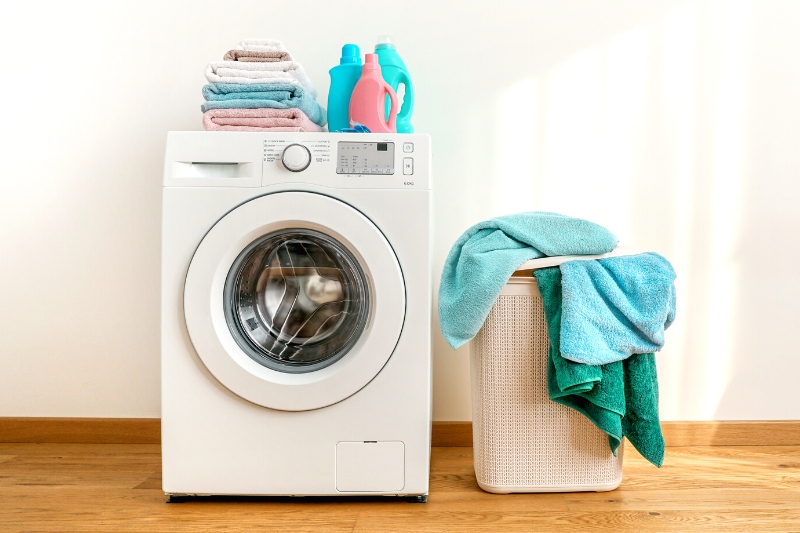
Unfortunately, when it comes to the number of towels you can safely put in your washing machine, there is no definite answer. This is because it depends on a variety of factors, such as the size of your towels and your machine’s capacity.
To work out how many towels your washing machine can hold and ensure they are properly cleaned, we suggest using the following guidelines:
- Check your machine’s capacity: The bigger the drum capacity of your washer, the more towels you will be able to fit inside at once. If you’re unsure of your machine’s capacity, we suggest you check with the manufacturer.
- Consider the size of your towels: Towels come in various sizes, from hand towels to large bath towels that measure up to 58 inches (1.5 metres) long. Consider the size of your towels in comparison to the machine’s capacity. Make sure you take the weight of the towels into account when they are wet to ensure the weight limit isn’t exceeded.
- Leave room for movement: When putting towels in a washing machine, you need to ensure that there is still room for movement in the drum. If you have to push down the towels to make room for more, you’re most likely overloading the machine. It is always best to try and only fill the drum three-quarters of the way full.
If you’re looking for a more definitive answer than this, check the sections below. Here we provide an approximation of how many towels you’re safe to wash at once.
6 kg washing machine
Small washing machine’s with a 6 kg drum can handle around five small towels at once.
However, we don’t recommend washing more than four bath towels at once. The average bath towel weighs around 1.5 kg when saturated with water, so four is the maximum for a 6 kg capacity.
7 kg washing machine
A 7 kg washing machine is considered standard, perfect for a household of two to three people. You should be able to wash between five and six small towels in the drum without overloading it. For larger bath towels, we recommend sticking with four so you don’t accidentally exceed capacity.
8 kg washing machine
Considered a “large” drum size, 8 kg washing machines are commonplace in family homes. You can use them to wash towels for the entire family in one go—they can take up to six small towels or five larger, highly absorbent bath towels.
9 kg washing machine
The largest washing machines on the market have a capacity of 9kg. As expected, these machines can be used to wash the most towels at once.
They take up to eight small towels or six of the largest, fluffiest bath sheets. Although they take up more space in your home, they’re great for large families.
What Happens If You Overload a Washing Machine?
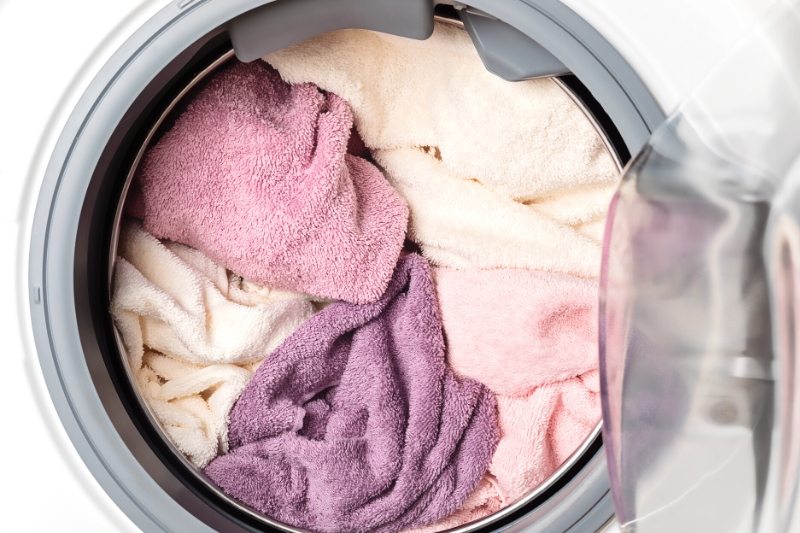
You might be wondering: What’s the problem with washing too many towels at once?
Indeed, when doing a load of washing, it can be tempting to keep pushing the items into the machine so that they can all be washed at once.
Although this may seem like you’re saving time and energy, it can cause you many problems that will cost you in the long run. The main issues you need to be aware of are:
Won’t clean your towels properly
When you overload the drum of your washing machine, it can decrease the appliance’s cleaning power.
This is because the lack of space prevents the towels or clothing from moving around properly, meaning the water and detergent distribute unevenly.
As a result, some patches of fabric will remain dirty and need to be re-washed.
Could ruin your clothes and towels
During a wash cycle, the drum of the machine rotates. This causes your clothes and towels to rub against each other but can also force them against the rubber door seal if the drum is too crowded.
This friction and pressure can cause the seal to leave marks and tears in the fabric, leaving the items damaged and unusable.
Could damage the machine
It’s easy to underestimate the weight of wet towels when you first load them into the washing machine. However, as they absorb water, their weight will significantly increase.
This additional weight puts pressure on the machine, which can damage the drum bearings and cause the glass door to shatter once it exceeds the machine’s weight limit.
Not only will this make your washer unusable, but it can also be a safety hazard.
Other Tips for Caring for Towels
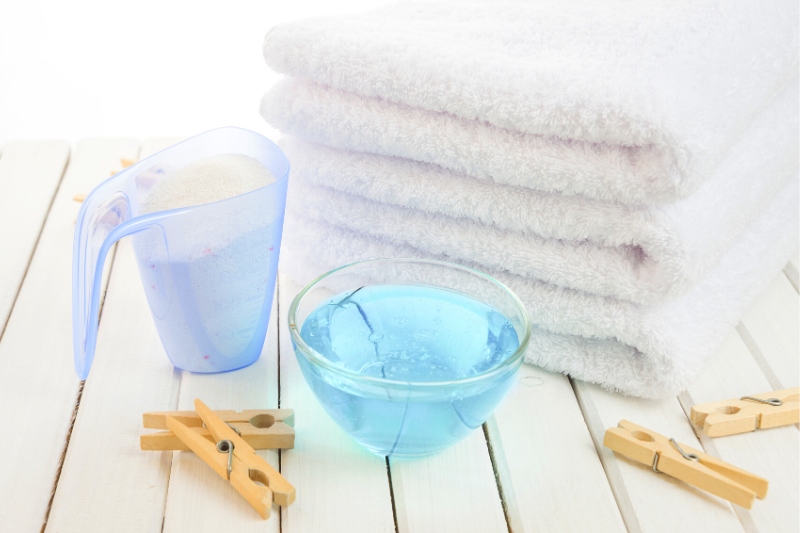
Properly caring for your towels is about more than just not overloading your washing machine.
Below are several tips that will also help you to prolong the lifespan of your towels and keep them feeling their best for longer.
- Separate your towels: Like when you’re washing clothes, you need to separate your towels before loading them into the machine. This not only means washing them apart from your clothing and bedding but also sorting them based on their colour and whether they have been used on humans or pets.
- Avoid fabric softener: Although fabric softener is great for your clothing, it will make your towels less absorbent. This is because the product leaves behind a waxy residue that repels water. If you want your towels to feel soft, try adding 60ml of white vinegar to your washing machine instead.
- Don’t over-dry: When towels are air-dried, it can cause them to become over-dried. This complete lack of moisture will make the fabric stiff, rough, and generally unpleasant to use. Your best option for drying towels is to tumble dry them at a low temperature instead, as this will make them soft and fluffy.
- Remove snags ASAP: If any loops form on your towel, it is best to cut them off so they can’t be pulled out any further. These loops often occur when a towel becomes snagged on something in the washing machine, but they could also be caused if the material catches on something when in use.
- Avoid bleaching agents: Many household cleaning products and acne skin treatments contain mild bleaching agents that can cause your towels to become discoloured. When using these products, ensure all traces have been thoroughly washed away before going in with your towel.
- Clean towels regularly: When used every day, it is best to wash your towels regularly to remove any bacteria that have built up. In general, we suggest switching them every three to five uses. We also recommend you wash any newly-bought towels before using them, as this helps to increase their absorbency.
- Use the right amount of detergent: To clean your towels effectively, you need to adjust the amount of detergent you use based on the number of towels in the machine. Ensure you follow the product instructions for the best results—too much detergent will leave behind a soapy residue, while too little won’t be able to clean them properly.
- Choose the right wash cycle: Make sure you choose an appropriate wash cycle based on the type of towels you’re cleaning and how soiled they are. In most cases, a normal wash cycle with warm or hot water is recommended.

Hannah has a passion for cleaning. She worked her way around Australia by cleaning hostels in exchange for free accommodation and used her cleaning skills to bag a job as a chalet host for a luxury ski company in France.
